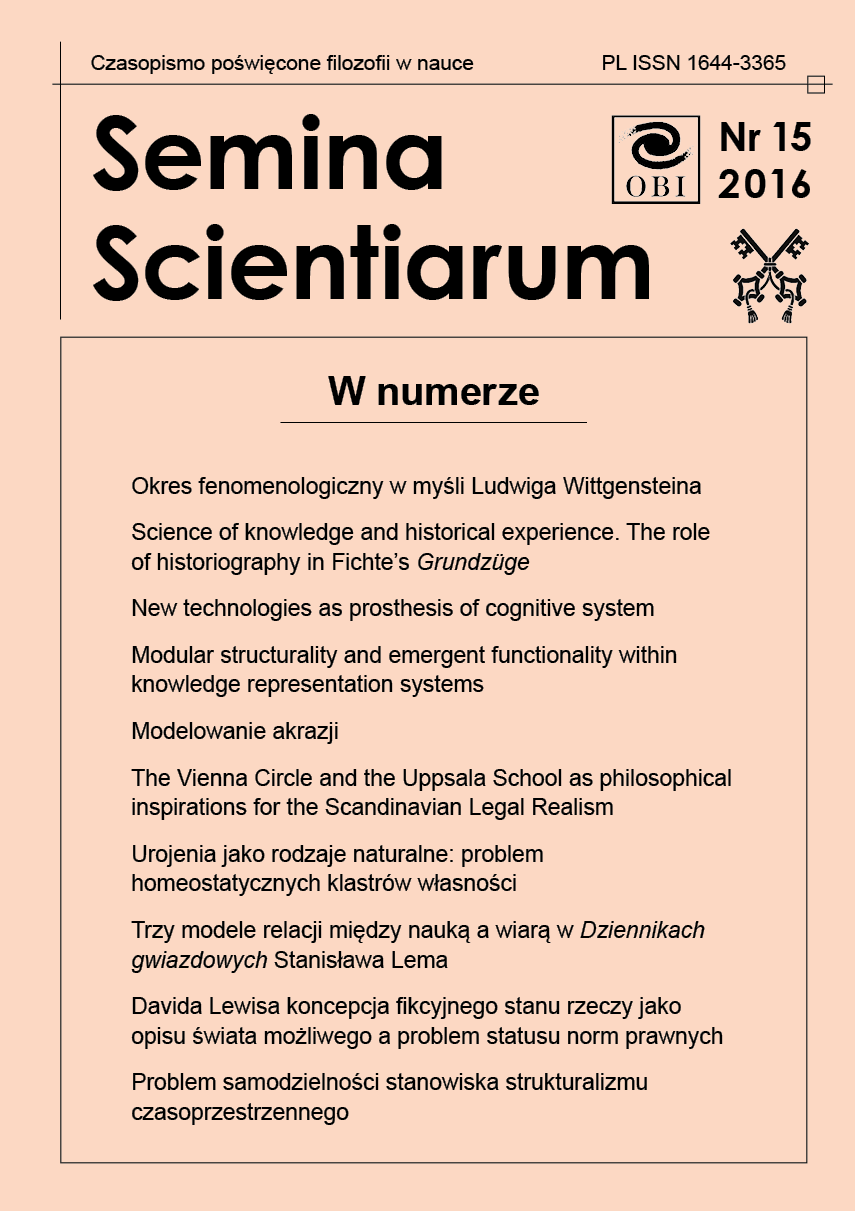New technologies as prosthesis of cognitive system
DOI:
https://doi.org/10.15633/ss.1768Słowa kluczowe:
prothesis, cognitive system, tools, extended mindAbstrakt
The aim of the paper is to show the way in which human cognitive system uses external prostheses. Currently developed technologies provide human beings with tools that change their way of functioning in the environment, their understanding and the perspective from which they perceive the world. Modifying systems of thoughts, reasoning and modes of operation non‑biological prostheses extend human cognitive system. A human being uses non‑biological interfaces for processing information from the external world.Bibliografia
Bach‑y‑Rita P., Kercel S. W., Sensory substitution and the human–machine interface, „Trends in Cognitive Sciences” 7 (2003) 12, pp. 541–546.
Bolter J. D., Człowiek Turinga: kultura Zachodu w wieku komputera, tłum. T. Goban‑Klas, Warszawa 1990.
Clark A., Being there: putting brain, body, and world together again, Cambridge 1997.
Clark A., Natural‑born cyborgs. Minds, technologies, and the future of human intelligence, New York 2004.
Cosmides L., Tooby J., Cognitive adaptations for social exchange, „The Adapted Mind” 1992, pp. 163–228.
Fodor J.A., Eksperci od wiązów. Język myśleński i jego semantyka, tłum. M. Gokieli, Warszawa 2001.
Nęcka E., Orzechowski J., Szymura B., Psychologia poznawcza, Warszawa 2013.
Platon, Fajdros, tłum. W. Witwicki, Kęty 2002.
Zyzik R., Emocje 2.0, http://www.granicenauki.pl/index.php/pl/granice‑nauki/umysl/436-emocje-20 (3.01.2014).
Pobrania
Opublikowane
Numer
Dział
Licencja
Prawa autorskie (c) 2016 Anna Sarosiek

Praca jest udostępniana na licencji Creative Commons Attribution-NonCommercial-NoDerivatives 3.0 Unported License.
Twórca oświadcza, że przysługują mu prawa autorskie do utworu i że nie są ograniczone w zakresie objętym niniejszym oświadczeniem oraz że utwór jest dziełem oryginalnym i nie narusza praw autorskich innych osób.
Twórca zezwala Uniwersytetowi Papieskiemu Jana Pawła II w Krakowie na nieodpłatne, niewyłączne i nieograniczone w czasie korzystanie z utworu, to jest:
- utrwalanie i zwielokrotnianie: wytwarzanie egzemplarzy utworu techniką drukarską, reprograficzną, zapisu magnetycznego oraz techniką cyfrową;
- obrotu oryginałem albo egzemplarzami, na których utwór utrwalono (wprowadzanie do obrotu, użyczenie lub najem oryginału albo egzemplarzy, publiczne wystawienie, wyświetlenie, a także publiczne udostępnianie utworu w taki sposób, aby każdy mógł mieć do niego dostęp w miejscu i w czasie przez siebie wybranym);
- włączenie utworu w skład utworu zbiorowego;
- udzielanie przez Uniwersytet Papieski Jana Pawła II w Krakowie sublicencji Creative Commons Uznanie autorstwa-Użycie niekomercyjne-Bez utworów zależnych 3.0 Polska
Uniwersytet Papieski Jana Pawła II w Krakowie udostępnia utwór na Platformie Czasopism należącej do uczelni, na licencji Creative Commons Uznanie autorstwa-Użycie niekomercyjne-Bez utworów zależnych 3.0 Polska. Tym samym uprawnia wszystkich zainteresowanych do korzystania z utworu pod następującymi warunkami:
- zostanie podany autor i tytuł utworu,
- zostanie podane miejsce publikacji (tytuł czasopisma i adres internetowy do oryginalnie opublikowanego utworu),
- utwór będzie dystrybuowany w sposób niekomercyjny,
- nie będą tworzone utwory zależne.

